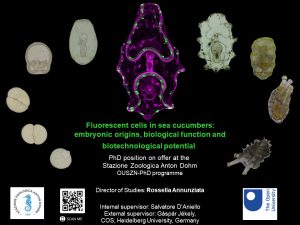PhD position exploring the embryonic origins, biological function and biotechnological potential of fluorescent cells in sea cucumbers
Posted by Rossella Annunziata, on 26 May 2025
Location: Stazione Zoologica Anton Dohrn, Naples
Closing Date: 14 June 2025

Holothuroids, or sea cucumbers, are a highly diverse group of echinoderms with key ecological functions and high economic value. They play fundamental roles in the marine benthic community as bioturbators of the seafloor and are considered a luxury food and a rich source of bioactive compounds, which all contribute to their widespread illegal fishing. While adult sea cucumbers have been extensively studied, particularly in ecotoxicology, biotechnology, and regeneration, the molecular mechanisms underlying their embryonic and larval development remain largely unexplored. This is likely due to the lack of standardized, reproducible protocols for culturing embryos under laboratory conditions.
We have recently established the Mediterranean Holothuria tubulosa as new experimental system to explore sea cucumber development from oocyte maturation up to the juvenile stage. Using high-resolution microscopy across developmental stages, we described embryonic and larval morphology and uncovered a novel fluorescent cell type located along the ciliary bands of the larvae and containing an unknown pigment with distinct spectral properties. Although their function remains unclear, preliminary evidence suggests that these cells have a role in immune responses and/or sensory pathways.
The overarching aim of this PhD project is to achieve a comprehensive characterization of these newly discovered cells, elucidating their development and function through a multidisciplinary approach. Methods will include live light microscopy, in situ hybridization, immunohistochemistry, functional transcriptomics, CRISPR-Cas9 genome editing, bacterial challenge assays, swimming behavior analysis, and chemical profiling of the pigment.
The student will conduct live imaging to trace the ontogeny of the fluorescent cells from early embryogenesis to their final positioning in the larva. Transcriptomic datasets recently obtained in the lab from fluorescent cells isolated from H. tubulosa larvae, will be analyzed to identify genes enriched in these cells. Once key transcripts are identified, genome editing will be employed to generate pigment-deficient larvae, whose physiological and behavioral phenotypes will be assessed through infection and motility assays. Concurrently, in collaboration with the Department of Pharmacy at the University of Naples Federico II, we will isolate and chemically characterize the pigment, laying the groundwork for future studies on its biotechnological potential.
The position is funded for 3 years. Candidates must hold a MSc degree in biology, biochemistry or related fields. Expertise in molecular biology techniques are desired but not required.
Selected candidates are expected to start their internship on October 1st 2025.
Director of studies: Rossella Annunziata, SZN
External supervisor: Gáspár Jékely, COS, Heidelberg University, Germany
Internal supervisor: Salvatore D’Aniello, SZN
FOR INFO CONTACT: rossella.annunziata@szn.it
TO APPLY: https://www.szn.it/…/ph-d-program/ph-d-program-open-calls
The closing date for applications is June 14th, 2025 h. 12.00
Closing Date: 14 June 2025
Duration: Fixed term

